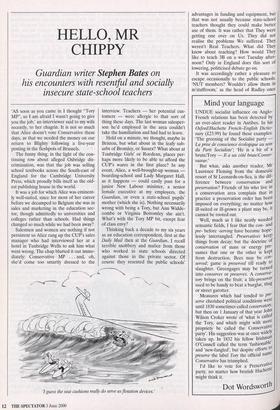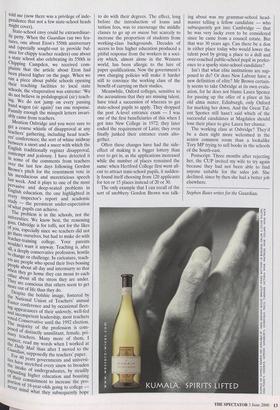HELLO, MR CHIPPY
his encounters with resentful and socially insecure state-school teachers
`AS soon as you came in I thought "Tory MP", so I am afraid I wasn't going to give you the job,' an interviewer said to my wife recently, to her chagrin. It is not so much that Alice doesn't vote Conservative these days, as that we needed the money on our return to Blighty following a five-year posting in the fleshpots of Brussels.
The funny thing, in the light of the con- tinuing row about alleged Oxbridge dis- crimination, was that the job was selling school textbooks across the South-east of England for the Cambridge University Press, which proudly bills itself as the old- est publishing house in the world.
It was a job for which Alice was eminent- ly well-suited, since for most of her career before we decamped to Belgium she was in sales and marketing in the education sec- tor, though admittedly to universities and colleges rather than schools. Had things changed so much while we had been away?
Salesmen and women are nothing if not persistent so Alice rang up the CUP's sales manager who had interviewed her at a hotel in Tunbridge Wells to ask him what went wrong. The chap blurted it out imme- diately: Conservative MP . . . and, oh, she'd come too smartly dressed to the interview. Teachers — her potential cus- tomers — were allergic to that sort of thing these days. The last woman salesper- son he'd employed in the area couldn't take the humiliation and had had to leave.
Hold on a minute, we thought, maybe in Brixton, but what about in the leafy sub- urbs of Bromley, or Sussex? What about at Tonbridge Girls' or Roedean, places per- haps more likely to be able to afford the CUP's wares in the first place? In any event, Alice, a well-brought-up woman boarding-school and Lady Margaret Hall, as it happens — could easily pass for a junior New Labour minister, a senior female executive at my employers, the Guardian, or even a state-school pupils' mother (which she is). Nothing necessarily wrong with being a Tory, but Ann Widde- combe or Virginia Bottomley she ain't. What's with the Tory MP bit, except fear of class envy?
Thinking back a decade to my six years as an education correspondent, first at the Daily Mail then at the Guardian, I recall terrible snobbery and malice from those who worked in state schools directed against those in the private sector. Of course they resented the public schools' 'I guess the seat cushions really do serve as flotation devices,' advantages in funding and equipment, but that was not usually because state-school teachers thought they could make better use of them. It was rather that They were getting one over on Us. They did not realise the problems We suffered. They weren't Real Teachers. What did They know about teaching? How would They like to teach 3B on a wet Tuesday after- noon? Only in England does this sort of lowering, politicised debate go on. It was accordingly rather a pleasure to escape occasionally to the public schools. `NUT members? Wouldn't allow them in m'staffroom,' as the head of Radley once told me (now there was a privilege of inde- pendence that not a few state-school heads alight covet). State-school envy could be extraordinar- ilY petty. When the Guardian ran two fea- tures, one about Eton's 550th anniversary and (specially sought-out to provide bal- ance for chippy teacher readers) one about i a state school also celebrating its 550th in Chipping Campden, we received com- plaints that the article about Eton had been placed higher on the page. When we ran a piece about public schools opening their teaching facilities to local state schools, the vituperation was extreme: 'We do not believe in pedalogogical (sic) teach- ing. We do not jump on every passing band wagen (sic again)' ran one response. Funnily enough the misspelt letters invari- ably came from teachers. Mention Oxbridge and you were sure to get a coarse whistle of disapproval at any teachers' gathering, including head teach- ers' conferences; the sort of whine midway between a snort and a sneer with which the English traditionally register disapproval, contempt and jealousy. I have detected it in some of the comments from teachers over the last few days following Gordon gown's pitch for the resentment vote in his mendacious and meretricious speech last week. And it plays to one of the most Pervasive and deep-seated problems in English education, the one highlighted in every inspector's report and academic study the persistent under-expectation of what pupils can achieve. The problem is in the schools, not the universities. We know best, the reasoning goes. Oxbridge is for toffs, not for the likes of you, especially since we teachers did not go there ourselves, but had to make do with teacher-training college. Your parents wouldn't want it anyway. Teaching is, after 9 , a deeply conservative profession, hostile 10 change or challenge. In caricature, teach- ers are people who spend their lives bossing People about all day and intermarry so that when they go home they can moan to each other about all the stress they are under. They are conscious that others seem to get More out of life than they do. Despite the bolshie image, fostered by the National Union of Teachers' annual LEaster conference and by occasional fleet- g appearances of their unlovely, well-fed incompetent leadership, most teachers Ted Conservative until the 1992 election. ', e majority of the profession is com- posed. of distinctly unmilitant, female, pri- ZY teachers. Many more of them, I thsPeet, read my words when I worked at Guardian, 1--)ailY Mad than after I moved to the ,arthan, supposedly the teachers' paper.. tiersor 40 years governments and universi- th have stretched every sinew to broaden 0,.`. intake of undergraduates, by steadily higher education and boasting p'0 their commitment to increase the pro- rievrtlen 18-year-olds going to college - mind what mind what they subsequently hope to do with their degrees. The effect, long before the introduction of loans and tuition fees, was to encourage the middle classes to go up en masse but scarcely to increase the proportion of students from working-class backgrounds. Decades of access to free higher education produced a pitiful response from the workers in a soci- ety which, almost alone in the Western world, has been allergic to the lure of paper qualifications. Now the government's own charging policies will make it harder still to convince the working class of the benefit of carrying on their studies.
Meanwhile, Oxford colleges, sensitive to the accusations that they are missing talent, have tried a succession of wheezes to get state-school pupils to apply. They dropped the post A-level entrance exam — I was one of the first beneficiaries of this when I got into New College in 1972; they later ended the requirement of Latin; they even finally junked their entrance exam alto- gether. Often these changes have had the side- effect of making it a bigger lottery than ever to get in, as the applications increased while the number of places remained the same: when Hertford College first went all- out to attract state-school pupils, it sudden- ly found itself choosing from 120 applicants for ten or 15 places instead of 20 or 30.
The only example that I can recall of the sort of snobbery Gordon Brown was talk- ing about was my grammar-school head- master telling a fellow candidate — who subsequently got into Cambridge — that he was very lucky even to be considered since he came from a council estate. But that was 30 years ago. Can there be a don in either place today who would lower the talent pool by giving a place to a dull and over-coached public-school pupil in prefer- ence to a sparky state-school candidate?
Isn't that what elite institutions are sup- posed to do? Or does New Labour have a new definition of elite? Mr Brown certain- ly seems to take Oxbridge at its own evalu- ation, for he does not blame Laura Spence for passing up the offer of a place at his old alma mater, Edinburgh, only Oxford for marking her down. And the Great Tal- ent Spotter still hasn't said which of the successful candidates at Magdalen should lose their place to give Laura her chance.
The working class at Oxbridge? They'd be a darn sight more welcomed in the senior common room than a lookalike Tory MP trying to sell books in the schools of the South-east.
Postscript: Three months after rejecting her, the CUP invited my wife to try again because they had not been able to find anyone suitable for the sales job. She declined, since by then she had a better job elsewhere.
Stephen Bates writes for the Guardian.






































































 Previous page
Previous page